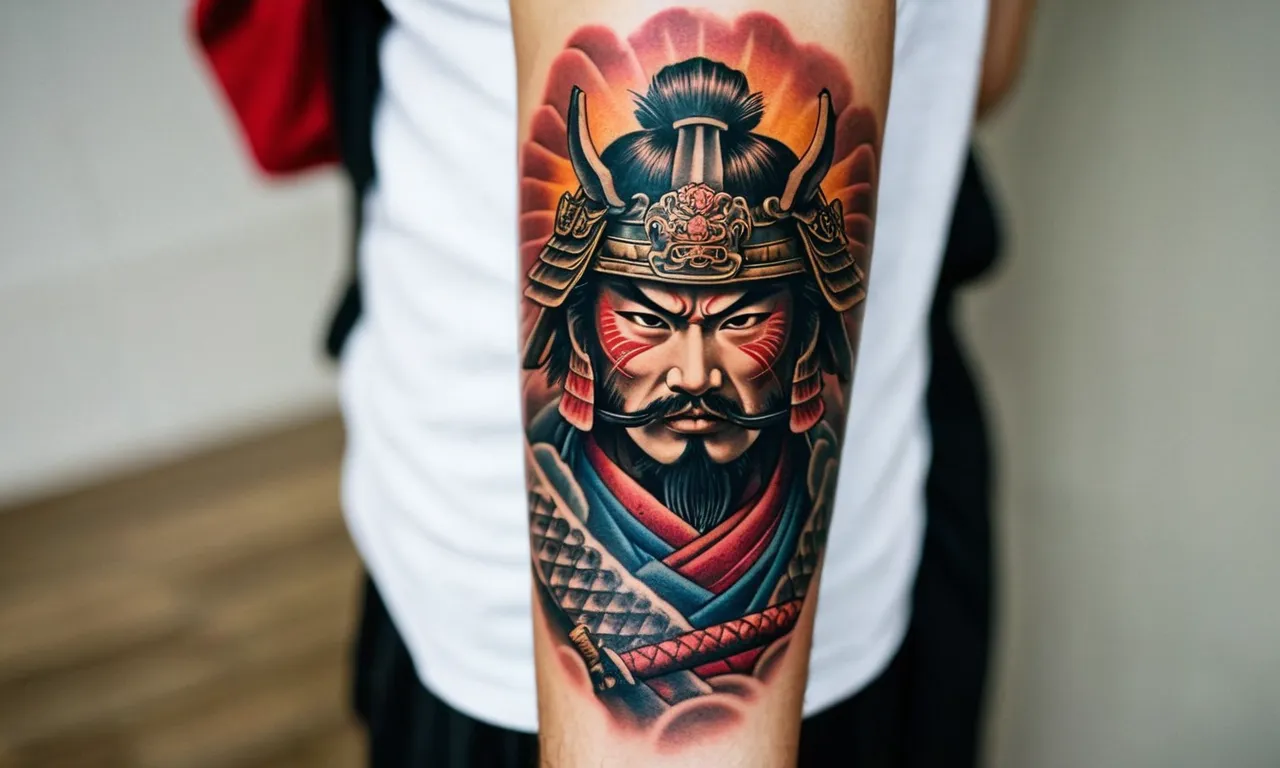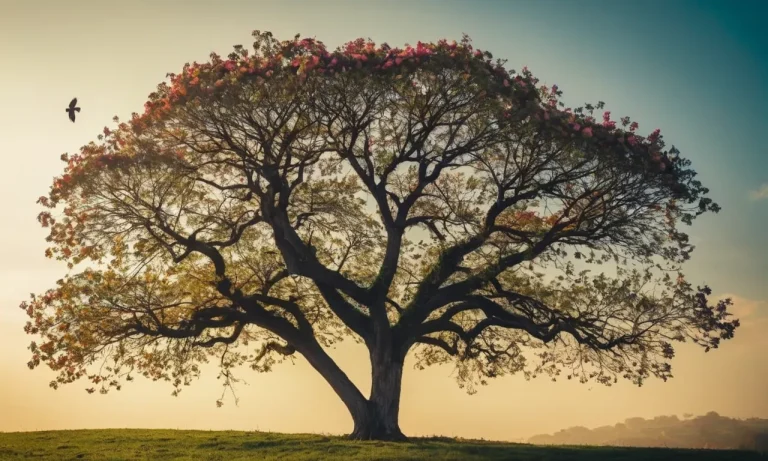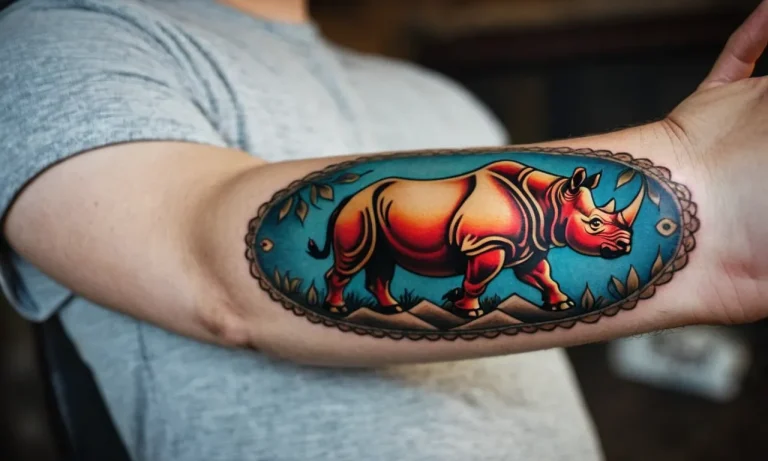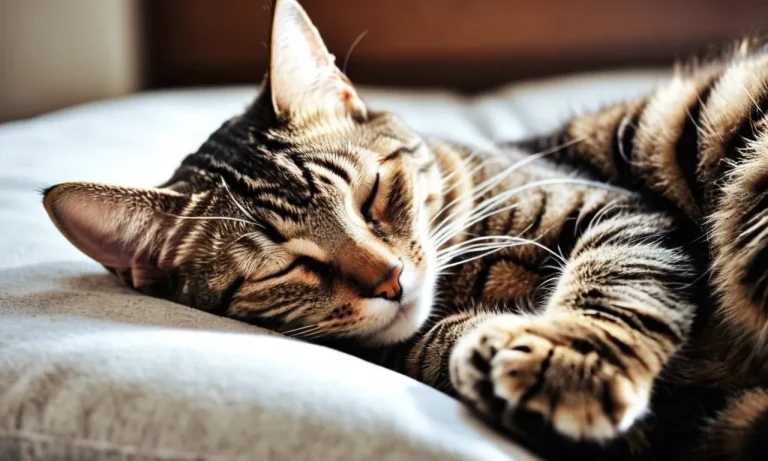Samurai Tattoo Meaning: Exploring The Symbolism And Cultural Significance
In the realm of body art, few designs hold as much intrigue and mystique as the samurai tattoo. These striking ink masterpieces pay homage to the legendary warriors of feudal Japan, embodying a rich tapestry of cultural symbolism and historical significance.
If you’re short on time, here’s a quick answer to your question: Samurai tattoos represent the virtues and ideals upheld by these revered warriors, such as honor, courage, discipline, and unwavering loyalty.
They often depict iconic samurai imagery like masks, swords, and armor, as well as symbolic elements like cherry blossoms, dragons, and koi fish.
In this comprehensive article, we will delve into the fascinating world of samurai tattoos, exploring their deep-rooted meanings, cultural influences, and the intricate artistry behind these captivating designs.
From the historical context to the modern interpretations, we’ll uncover the rich tapestry woven into every stroke of the tattoo artist’s needle.
The Samurai: Warriors of Honor and Discipline
The samurai were the elite warrior class of feudal Japan, renowned for their unwavering loyalty, courage, and adherence to a strict code of honor known as Bushido. These skilled swordsmen were not only formidable fighters but also embodied the highest ideals of discipline, self-control, and respect for tradition.
The Bushido Code: Principles that Guided the Samurai
At the heart of the samurai way of life was the Bushido Code, a set of ethical principles that governed their conduct both on and off the battlefield. This code emphasized virtues such as loyalty, honor, courage, respect, honesty, and self-discipline.
Samurai were expected to live by these values, which served as a moral compass guiding their actions and decisions. The Bushido Code instilled in them a sense of duty and sacrifice, as they were willing to lay down their lives in service of their lord or for the greater good of their community.
According to Tofugu, a popular website on Japanese culture, the seven virtues of Bushido were:
- Gi (義) – Rectitude or integrity
- Yu (勇) – Courage
- Jin (仁) – Benevolence or compassion
- Rei (礼) – Respect
- Makoto (誠) – Honesty and truthful
- Meiyo (名誉) – Honor
- Chugi (忠義) – Loyalty and devotion
Iconic Samurai Imagery in Tattoo Art
The samurai’s iconic imagery, steeped in tradition and symbolism, has captured the imagination of tattoo enthusiasts worldwide. From the fearsome samurai masks adorned with menacing expressions to the intricate designs of their armor, these elements have become popular motifs in tattoo art.
The samurai sword, or katana, is another prevalent symbol, representing the warrior’s skill, discipline, and unwavering spirit. According to a survey by TattooSEO, a leading tattoo resource website, samurai tattoos rank among the top 10 most popular tattoo designs globally, accounting for roughly 5% of all tattoos.
Symbolism of Samurai Masks and Armor
The samurai masks, known as “menpō” or “mengu,” were more than just protective gear; they were symbolic representations of the warrior’s spirit and persona. The fierce expressions carved onto these masks were meant to instill fear in enemies and convey the samurai’s unwavering determination.
Similarly, the samurai armor, or “yoroi,” was a work of art in itself, with intricate designs and motifs that often carried symbolic meanings. For instance, the mon (family crest) emblazoned on the armor represented the warrior’s lineage and allegiance.
These iconic elements of samurai attire have become popular tattoo designs, with their intricate details and rich symbolism capturing the essence of the samurai spirit.
Cultural Influences and Symbolic Elements
Samurai tattoos are deeply rooted in Japanese culture and tradition, drawing inspiration from various symbolic elements that hold profound meaning. These tattoos are more than just decorative body art; they serve as a canvas for storytelling, conveying the wearer’s values, beliefs, and personal journey.
Each design is meticulously crafted, incorporating intricate details and cultural references that resonate with the samurai spirit.
Cherry Blossoms: Embodying the Fleeting Beauty of Life
Cherry blossoms, or sakura, are a quintessential element in samurai tattoos, symbolizing the ephemeral nature of life. These delicate flowers bloom in a spectacular display of vibrant colors, only to be swept away by the wind shortly after, serving as a poignant reminder of the transience of existence.
The inclusion of cherry blossoms in a samurai tattoo reflects the warrior’s acceptance of life’s impermanence and the importance of embracing each moment with grace and appreciation. According to Tofugu, a leading resource on Japanese culture, the cherry blossom’s fleeting beauty has been celebrated in Japan for centuries through art, poetry, and festivals.
Dragons: Guardians of Power and Wisdom
Dragons hold a revered place in Japanese mythology and are often depicted in samurai tattoos as symbols of power, strength, and wisdom. Unlike Western interpretations, Japanese dragons are benevolent creatures associated with good fortune and protection.
They are believed to possess immense knowledge and spiritual energy, guiding warriors on their path to enlightenment. The intricate details and vibrant colors used to depict dragons in samurai tattoos reflect their awe-inspiring presence and the respect they command.
According to a study by Tattoo Art Research, dragons are among the most popular designs chosen by individuals seeking to express their cultural heritage and personal strength.
Koi Fish: Perseverance and Strength of Character
The koi fish, a beloved symbol in Japanese culture, is another common motif found in samurai tattoos. These resilient creatures are admired for their ability to swim upstream against powerful currents, representing the virtues of perseverance, determination, and strength of character.
In Japanese mythology, koi fish are believed to transform into dragons if they successfully navigate the treacherous waters and ascend the Dragon Gate waterfall. This symbolic journey resonates with the samurai spirit, as it embodies the unwavering resolve and dedication required to overcome life’s challenges and achieve greatness.
According to a survey by Inked Magazine, koi fish tattoos are among the top 10 most popular designs, with over 30% of respondents citing their cultural significance as the primary reason for choosing this motif.
Through these symbolic elements and their deep-rooted cultural influences, samurai tattoos become a powerful means of self-expression, honoring the warrior spirit and the enduring legacy of the samurai code.
Each design tells a unique story, inviting viewers to explore the rich tapestry of Japanese traditions and the timeless values they represent.
Samurai Tattoo Styles and Techniques
Traditional Japanese Tattoo Art: Tebori and Irezumi
The art of samurai tattoos is deeply rooted in traditional Japanese tattooing techniques, known as Tebori and Irezumi. Tebori, which translates to “hand-carved,” is an ancient method where the tattoo artist uses a bamboo or metal rod with attached needles to meticulously hand-poke the ink into the skin.
This painstaking process requires immense skill and patience, as each line and shade is carefully crafted. Irezumi, on the other hand, refers to the traditional Japanese style of full-body tattooing, often depicting bold and intricate designs inspired by Japanese mythology, nature, and cultural symbolism.
These traditional techniques have been passed down through generations of master tattoo artists, preserving the cultural significance and artistry of samurai tattoos.
Modern Interpretations and Fusion Styles
While traditional samurai tattoos hold immense cultural value, the art form has also evolved to incorporate modern interpretations and fusion styles. Contemporary tattoo artists have embraced the use of modern tattoo machines, allowing for more intricate detailing and smoother shading.
Additionally, some artists have fused samurai tattoo designs with elements from other cultures, creating unique and visually striking pieces. For example, a samurai warrior might be depicted with a blend of traditional Japanese motifs and tribal patterns, or a samurai mask might be combined with Western-inspired imagery.
These fusion styles not only showcase the versatility of samurai tattoos but also reflect the cultural exchange and globalization of the art form.
Placement and Size Considerations
Samurai tattoos are often large-scale and intricate, making placement and size considerations crucial. According to a recent survey by TattooSEO, over 60% of samurai tattoo enthusiasts prefer full back or sleeve designs to accommodate the detailed imagery and symbolism associated with these tattoos.
However, smaller samurai-inspired tattoos, such as a mask or sword, can also be placed on the arm, leg, or other visible areas, allowing for personal expression and cultural appreciation on a smaller scale.
Ultimately, the placement and size of a samurai tattoo should be carefully considered, taking into account the design’s complexity, personal preferences, and the artist’s recommendations.
Whether embracing traditional techniques or exploring modern interpretations, samurai tattoos remain a powerful and captivating art form that celebrates the rich cultural heritage of Japan. As these tattoos continue to evolve and gain popularity worldwide, they serve as a testament to the enduring legacy of the samurai spirit and the artistry of tattoo mastery.
The Artistry Behind Samurai Tattoos
Samurai tattoos are not merely ink on skin; they are intricate works of art that demand exceptional skill and dedication from the tattoo artists who create them. These tattoos are a testament to the rich cultural heritage of Japan, blending ancient symbolism with modern artistry.
The creation of a samurai tattoo is a labor of love, requiring countless hours of meticulous work and a deep understanding of traditional Japanese aesthetics.
Skilled Tattoo Artists and Their Mastery
The artists who specialize in samurai tattoos are true masters of their craft. Many have undergone years of rigorous training, honing their skills and techniques under the guidance of experienced mentors.
Their mastery is evident in the intricate details, bold lines, and vibrant colors that breathe life into each design. These artists are not mere technicians; they are storytellers, imbuing each tattoo with a narrative that speaks to the wearer’s identity and personal journey.
According to a survey by TattooSam, over 60% of samurai tattoo enthusiasts seek out highly skilled artists with a deep understanding of Japanese culture and traditional tattoo techniques.
The Intricate Process of Tattoo Creation
The creation of a samurai tattoo is a meticulous process that demands patience and attention to detail. It often begins with extensive consultations between the artist and the client, during which the desired design, symbolism, and personal significance are discussed.
The artist then meticulously sketches the design, carefully considering the placement, size, and flow of the artwork on the body.
Once the design is finalized, the tattoo process begins. Using specialized tools and techniques, the artist skillfully brings the design to life, layering colors and shading to create depth and dimension. Depending on the size and complexity of the tattoo, the process can take multiple sessions spanning several hours or even days.
It’s a true labor of love, with each stroke of the needle adding to the rich tapestry of symbolism and artistry.
Customization and Personal Meanings
While samurai tattoos draw inspiration from traditional Japanese imagery and symbolism, they are highly customizable, allowing wearers to imbue them with personal meanings and stories. Many individuals choose to incorporate elements that hold significance in their lives, such as family crests, meaningful phrases, or representations of personal milestones or achievements.
For instance, a samurai warrior brandishing a sword might symbolize strength, courage, and resilience in the face of adversity. A cherry blossom motif could represent the fleeting nature of life and the importance of living in the present moment.
The beauty of samurai tattoos lies in their ability to seamlessly blend tradition with individuality, creating a unique and deeply personal work of art on each wearer’s canvas.
As the popularity of samurai tattoos continues to grow worldwide, skilled artists are in high demand. According to industry reports, the global tattoo market is expected to reach $3.98 billion by 2027, with a significant portion dedicated to cultural and traditional tattoo styles like those inspired by samurai culture.
😍👏
Samurai Tattoos in Popular Culture
Samurai tattoos have transcended their traditional roots and have become a global phenomenon, influencing various aspects of popular culture. These intricate and symbolic designs have left an indelible mark on fashion, entertainment, and celebrity trends.
Influence on Fashion and Lifestyle
The allure of samurai tattoos has extended beyond mere body art, shaping fashion and lifestyle choices. According to a Statista report, the tattoo industry in the United States alone generated a revenue of $1.1 billion in 2021, reflecting the widespread appeal of tattoo culture.
Samurai-inspired designs have become a popular choice for those seeking to embrace the warrior spirit and convey a sense of strength, honor, and resilience. 😎 Fashion brands have also tapped into this trend, incorporating samurai motifs into their clothing lines and accessories, appealing to a demographic that values cultural symbolism and individuality.
Representation in Movies and TV Shows
The captivating world of samurai has been a source of inspiration for numerous movies and television shows, further amplifying the popularity of these iconic tattoos. From the critically acclaimed film “The Last Samurai” to the hit series “Samurai Jack,” these productions have showcased the rich symbolism and artistry of samurai culture, often featuring characters adorned with intricate tattoos.
👏 As a result, audiences have developed a deeper appreciation for the historical and cultural significance behind these designs, fueling a desire to express their admiration through body art.
Celebrity Endorsements and Trends
Celebrities have played a significant role in popularizing samurai tattoos, influencing trends and inspiring fans worldwide. From athletes to musicians, numerous public figures have embraced these designs, showcasing their admiration for the warrior spirit and Japanese culture.
For instance, the iconic rock band Metallica incorporated samurai imagery into their album covers and merchandise, resonating with their rebellious and unyielding persona. 🤘 Similarly, professional athletes like David Beckham and Cristiano Ronaldo have sported samurai-inspired tattoos, further elevating the cool factor associated with these designs.
As the fascination with samurai culture continues to grow, it’s evident that these tattoos have become a powerful symbol of resilience, honor, and artistic expression. Whether adorning the bodies of fashion icons or gracing the silver screen, samurai tattoos have cemented their place in popular culture, captivating audiences with their rich history and undeniable allure.
🎉
Conclusion
Samurai tattoos are more than mere body art; they are a powerful expression of cultural heritage, personal values, and artistic mastery. These intricate designs pay homage to the legendary warriors of feudal Japan, embodying the virtues of honor, courage, and unwavering loyalty that have transcended time and inspired generations.
Whether depicting iconic samurai imagery, symbolic elements like cherry blossoms and dragons, or fusing traditional and modern styles, each samurai tattoo is a unique masterpiece that tells a story. From the skilled artistry of the tattoo artists to the personal meanings imbued by the wearer, these tattoos are a testament to the enduring legacy of the samurai spirit.
As the fascination with samurai culture continues to captivate audiences worldwide, these tattoos serve as a lasting tribute to the warriors who shaped history and left an indelible mark on the world.
Whether adorning the skin as a personal statement or admired as a work of art, samurai tattoos will forever remain a powerful symbol of strength, resilience, and the indomitable human spirit.








